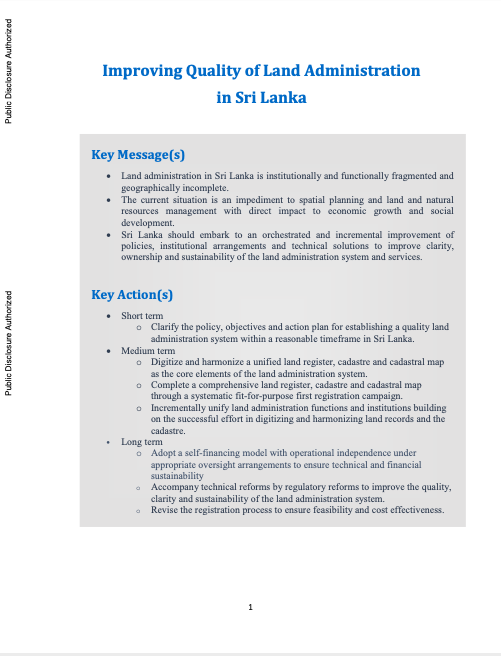The World Bank is a vital source of financial and technical assistance to developing countries around the world. We are not a bank in the ordinary sense but a unique partnership to reduce poverty and support development. The World Bank Group has two ambitious goals: End extreme poverty within a generation and boost shared prosperity.
- To end extreme poverty, the Bank's goal is to decrease the percentage of people living on less than $1.25 a day to no more than 3% by 2030.
- To promote shared prosperity, the goal is to promote income growth of the bottom 40% of the population in each country.
The World Bank Group comprises five institutions managed by their member countries.
The World Bank Group and Land: Working to protect the rights of existing land users and to help secure benefits for smallholder farmers
The World Bank (IBRD and IDA) interacts primarily with governments to increase agricultural productivity, strengthen land tenure policies and improve land governance. More than 90% of the World Bank’s agriculture portfolio focuses on the productivity and access to markets by small holder farmers. Ten percent of our projects focus on the governance of land tenure.
Similarly, investments by the International Finance Corporation (IFC), the World Bank Group’s private sector arm, including those in larger scale enterprises, overwhelmingly support smallholder farmers through improved access to finance, inputs and markets, and as direct suppliers. IFC invests in environmentally and socially sustainable private enterprises in all parts of the value chain (inputs such as irrigation and fertilizers, primary production, processing, transport and storage, traders, and risk management facilities including weather/crop insurance, warehouse financing, etc
For more information, visit the World Bank Group and land and food security (https://www.worldbank.org/en/topic/agriculture/brief/land-and-food-security1
Resources
Displaying 121 - 125 of 4907Improving Quality of Land Administration in Sri Lanka
Land administration in Sri Lanka is institutionally and functionally fragmented and geographically incomplete. The current situation is an impediment to spatial planning and land and natural resources management with direct impact to economic growth and social development. Sri Lanka should embark to an orchestrated and incremental improvement of policies, institutional arrangements and technical solutions to improve clarity, ownership and sustainability of the land administration system and services.
Brazil Land Governance Assessment
This report synthesizes and discusses the findings of a series of self-assessments of the land governance1 situation in Brazil conducted entirely by knowledgeable Brazilians using a standardized indicator-based diagnostic assessment instrument. The findings, therefore, represent the perception of local experts based on their collective experience and available data. The primary audience of this report comprises federal and state officials directly involved in land governance within the assessed states and in the other states.
World Bank Support for Open Data 2012-2017
This report summarizes the World Bank’s activities to support the Open Data efforts of developing countries during the period 2012 - 2017. It is largely descriptive, but Chapter 4 includes key analysis and lessons learned. The main objectives of this report are to share information within the World Bank and with its partners and client countries, and to preserve the institutional memory and highlight the lessons learned as a way to improve the development effectiveness of Open Data.
SDG Indicator 1.4.2: Approach and data availability
Presentation at the LandAc conference in June 2017, by Thea Hilhorst, representative of the World Bank, custodian agency of the development of SDG indicator 1.4.2.
Thea Hilhorst presents the approach to measuring this indicator and the available data that can be used.
SDG Indicator 1.4.2: Approach and data availability
Presentation at the LandAc conference in June 2017, by Thea Hilhorst, representative of the World Bank, custodian agency of the development of SDG indicator 1.4.2.
Thea Hilhorst presents the approach to measuring this indicator and the available data that can be used.









